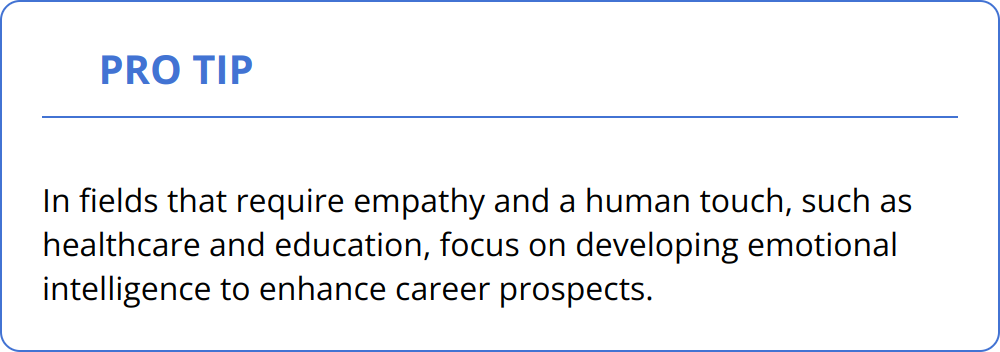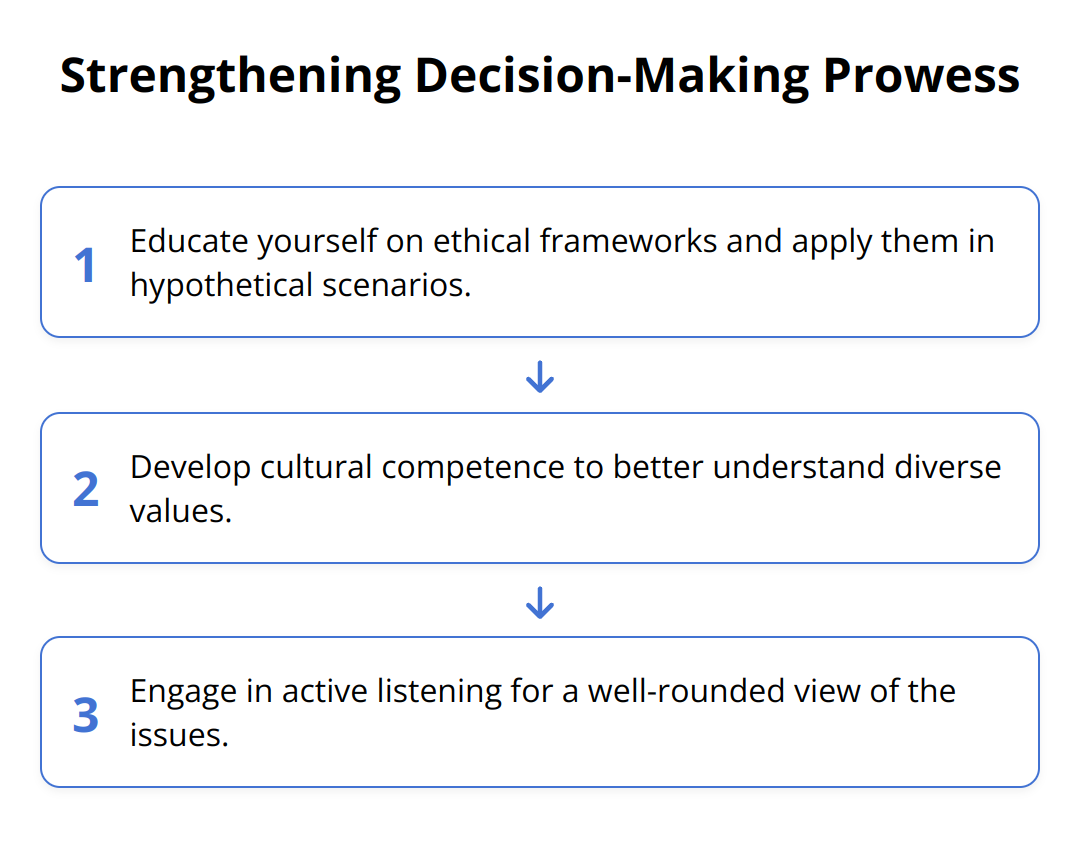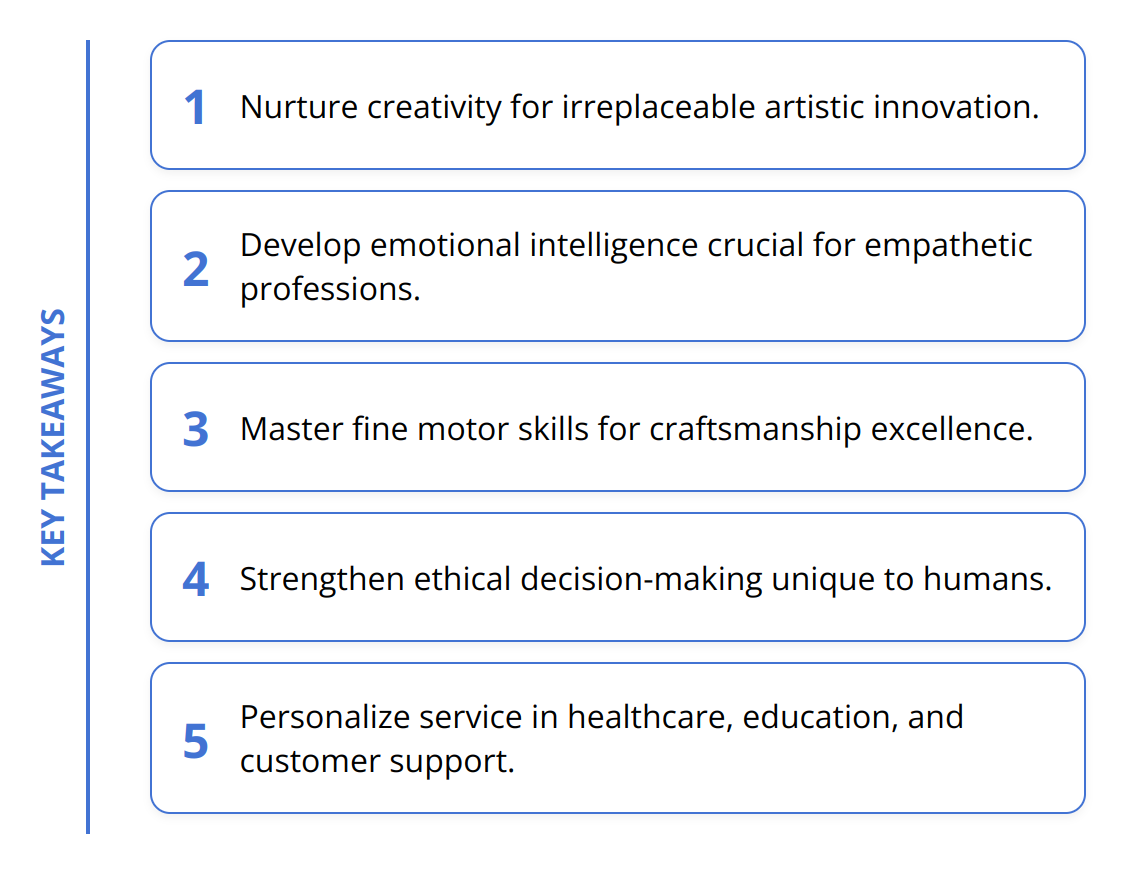As technology rapidly advances, there’s a growing discussion about the role of artificial intelligence in the workplace. We at Emplibot recognize that while AI can perform many tasks, there are jobs where the human element is indispensable.
This post explores professions where creativity, empathy, and fine-tuned motor skills are key. Moreover, it highlights the irreplaceable value of human decision-making in various sectors, underscoring the importance of nurturing skills that are inherently human.
Can AI Replace Human Creativity?
The notion that AI can replicate the nuanced capabilities of human creativity is a hotly debated topic, but let’s set the record straight. Artistic innovation and creative storytelling stand firmly in the realm of humans. Take for example professional artists and designers, whose work is infused with emotional depth and unique perspectives drawn from life experiences. Even with advancements in AI, it lacks the subjective touch and deep emotional resonance true creativity demands.
Similarly, writers and content creators weave intricate narratives that resonate on a personal level. Humans excel at understanding cultural nuances and the complexities of language. While AI might assist with some aspects of content creation, it’s our human flair for emotionally compelling storytelling that keeps readers engaged.

Emotional Intelligence: AI’s Limitation
Empathy and emotional intelligence are paramount in professions like therapy and counseling. These roles rely on human sensitivity and intuition—attributes AI simply does not possess. Therapists must read between the lines, understanding unspoken cues and emotions to provide comfort and guidance that AI can’t emulate. Compassion is not codeable.
Professions in healthcare, from nurses to surgeons, are yet another example where empathy is critical. The reassuring touch of a nurse or the bedside manner of a doctor has profound effects on patient outcomes. The medical field relies on a human touch that AI can’t provide.
Educators are another great example. They adapt their teaching to each student’s unique learning style and emotional needs—a level of personalization AI cannot achieve.

Mastery of Human Dexterity
When it comes to manual skills and craftsmanship, AI machines may be far from replicating the expertise of a master craftsperson. Professions such as carpenters, sculptors, and mechanics use a blend of strength, precision, and fines skills. The work of these skilled professionals requires a degree of finesse that goes beyond the binary world of AI capabilities.
Chefs, for instance, mix artistry with technique to deliver culinary experiences AI cannot replicate. They adjust their recipes by taste, a sense that machines can’t perceive.
In conclusion, while AI might offer assistance, it cannot replace the depth of human creativity, the warmth of emotional intelligence, nor the precision of fine motor skills. For those considering a career or looking to strengthen their skillset, cultivating these inherently human traits might just be your most secure asset in a rapidly evolving job market.
If you’re interested in bolstering your industry knowledge, exploring practical tips and insights on content creation or how AI complements marketing strategies without supplanting the human touch, visit our blog pages for in-depth guidance.
Making the Tough Calls
In the intricacies of professional settings, human decision making stands as a pillar that AI simply cannot eclipse. It’s the complex ethical and moral judgments, finely attuned to contexts and cultures, that highlight the indispensability of the human touch in certain job roles. The human brain’s capacity to weigh multiple factors, including ambiguous emotional and social elements, is unmatched by binary computations.
Healthcare Leaders and Professionals: In healthcare, leaders and professionals are frequently faced with life-and-death decisions. With stakes this high, there’s no algorithmic substitute for the moral reasoning and ethical considerations that medical professionals apply. They must balance patient care, resource allocation, and sensitive ethical choices that can profoundly affect lives.
Executives and Managers: Business decisions often hinge on understanding the broader implications for society, the environment, and corporate responsibility. Executives must navigate complex stakeholder interests, where each decision can ripple through the economy and society. Here, human judgment informed by experience and ethical considerations is essential.

Legal Experts: Judges and legal professionals interpret laws and deliver justice, a process steeped in cultural, societal, and individual norms and values. The nuance involved in considering precedents, empathizing with human circumstances, and upholding justice confirms that AI has no seat in the judiciary.

Cross-Cultural Consultants and Negotiators: Deftly navigating negotiations and discussions across cultures is another arena where AI falls short. Humans can interpret cultural subtleties and navigate the intricate dynamics of cross-cultural communication, ensuring respectful and successful interactions that foster globalization.
Human Resources Specialists: In HR, decision-making involves evaluating not just skills and experience, but also the fit of potential employees with company culture. Personal judgment is key in predicting which candidate will contribute positively to the team dynamic.
Incorporating AI in digital advertising is beneficial in data analysis, but the final decisions still rest on human marketers who understand the subtle shifts in consumer behavior and cultural trends.
Professionals in these roles don’t just follow algorithms; they lead with insight. They are strategists who leverage their unique human abilities to make judgment calls that can make or break futures. AI may perform many tasks, but the stakes and subtleties involved in these professions speak to a need for human oversight that technology can’t replicate. Whether you are an aspiring professional or seasoned expert, focusing on ethical decision-making, cultural intelligence, and emotional acuity can fortify your indispensable role in the workforce.
Why is Human Touch Vital?
The impact of a human touch in certain sectors is far-reaching, often making the difference between a standard service and an exceptional one. In areas like healthcare, education, and customer service, the nuances of human interaction are paramount and cannot be replaced by AI.
Healthcare Beyond Prescriptions
In healthcare, the dynamic between provider and patient is fundamental. A computer can store vast amounts of medical knowledge, but it’s the physician who applies it with a compassionate understanding of each patient’s unique situation. Empathy-driven care leads to better patient outcomes—an AI simply can’t hold a patient’s hand through recovery or offer hope during treatment. Providers make in-the-moment assessments that consider the patient’s emotional state and their physical symptoms, a holistic approach that is indispensable.

Patients entrust their lives to healthcare professionals, expecting a trustworthy connection that goes beyond the capabilities of algorithms and machine learning. It’s the personal reassurance from a healthcare provider, the confidence they instill, and the warmth of their care that truly heals. Introducing AI into healthcare marketing strategies helps reach wider audiences, but the heart of patient care will always beat with a human rhythm.
Education Crafted for the Individual
Education is another sector where the individualized touch of a teacher shapes the future. Learning is not a one-size-fits-all process. Educators inspire, motivate, and understand their students beyond test scores and attendance sheets. They craft lessons to match different learning styles, recognize when a student is struggling and respond with tailored support. Teachers nurture not just academic but also social and emotional development—an AI algorithm can’t mentor a child or spark a love for learning.
A teacher’s ability to adapt in real-time to the classroom atmosphere, the hands-on guidance they offer, and their role as a role model are qualities that technology cannot capture. While AI can provide additional learning tools and assist with personalization in education, the human element remains at the core of educational success.
The Advantage of Personalized Customer Service
When it comes to customer service, people often prefer the personal touch over an automated response. Customers seek understanding, empathy, and effective communication—a comforting voice at the other end of the line or a thoughtful reply to an inquiry can turn a one-time buyer into a loyal customer. Human representatives resolve complex issues with a level of care and personal attention that fosters strong customer relationships.
A well-trained customer service team can read customer emotions, offer immediate reassurances, and provide solutions tailored to individual needs. They are the face of a company’s brand integrity. Using AI to gather customer insights can enrich service strategies, but the final connection made with customers is uniquely human.
While embracing technological advances can streamline processes and improve efficiency, it’s pivotal to acknowledge that machines will not supersede the human touch in these critical roles. Fostering human-centric skills and approaches in healthcare, education, and customer service not only enriches these professions but also sustains their irreplaceable value in society.
Final Thoughts
As we reflect on the landscape of AI and its impact on the workforce, we come to appreciate the unique capabilities that define the human spirit and its role in the job market. AI’s ascension in the workplace sparks a conversation not about replacement, but about augmentation—complementing human skills, not supplanting them.

Understanding the limitations of AI places a spotlight on the value of human ingenuity. Jobs infused with the essence of emotional intelligence, creative thought, and intricate decision-making highlight the evergreen nature of human-centric roles. These skills shape a foundation for professions that AI cannot shake, demanding a focus on nurturing what is inherently ours.
Here are reasons to continue valuing and developing human-centric skills in the workforce:
-
Professions, where sensitive emotional interactions are necessary, point to the irreplaceable nature of human empathy.
-
Creative and strategic roles rely on the depth and originality only human minds can produce.
-
The human touch in decision-making accounts for ethical and cultural complexities beyond AI’s compute.
The future of work seems to pivot not on the fear of obsolescence, but on the potential for growth in areas untouched by algorithms. Consider this an encouragement to invest in and harness those essentially human traits—creativity, empathy, and intuition. It’s an invitation to strengthen what makes us uniquely valuable in a world where technology and humanity converge.
We at Emplibot believe in empowering businesses to thrive amidst these advancements. If you’re looking to bolster your online presence while keeping the human touch at the core of your operations, let Emplibot assist by providing SEO-friendly articles directly on your website, enhancing your content strategy while maintaining the essence that sets you apart.
In conclusion, AI’s growth will continue to transform industries, but the essence of human work remains defined by the very skills and qualities AI cannot replicate. We stand at the threshold of a new era—one where the dance between technology and human skill defines the future. Develop, hone, and value those irreplaceable human skills, and witness how they open doors to opportunities that no machine can walk through. Embrace the synergy of human touch and AI efficiency, and together, we pave the path to a world of balanced technological harmony.

